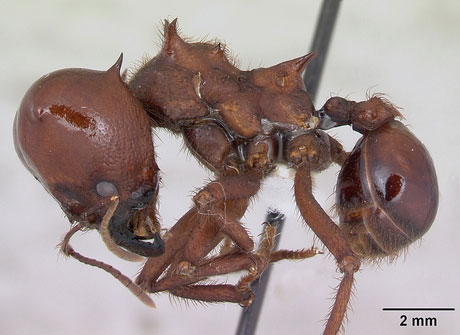The encyclopedia of life has achieved 170,000 titles
The encyclopedia of life http://www.eol.org (EOL), a $ 100 million project launched in 2007, has now reached a number of 170,000 titles and is continuing Additional research on life expectancy, climate change and even the spread of pests.
This number is really impressive because when it was released in February 2008 the dictionary only had 30,000 titles.
According to James Edwards, EOL executive director based at the Smithsonian Institute in Washington (USA), 170,000 items have been scrutinized by experts on content and presentation. "We are increasing the speed of updating," he said, saying that everyone, from students to scientists, can use EOL as a specialized guidebook. can contribute to the dictionary a photograph or record of a strange animal that appears in the area where it lives or signs of climate change.

An insect in EOL online encyclopedia (Photo: EOL)
This dictionary is also supporting scientists in a number of areas, such as human life, by examining the life span of related species.
The dictionary is currently searching for data on how to kill harmful insects such as caterpillars from the Balkans that have grown rapidly to Europe in the past two decades. It attacks the leaves of the horse chestnut tree causing yellow leaves in mid-summer and " has gone beyond Europe, threatening ecosystems in Southeast Asia, North America and some other places, wherever horse chestnut trees are appeared ".
EOL said it would help "the community identify and understand invasive species through detailed descriptions and maps, thereby slowing down the global spread of pests with quick remedies." more, more effective '.
EOL also expanded the project to study fossils . This work has been carried out in some areas in Australia, the Netherlands or China, mainly studying the life of organisms from fossil samples.
EOL executives said the project received an additional $ 12.5 million from two private institutions and " the project still needs more money ". Another problem is that 20,000 new species are described every year, and it is estimated that the number of species on a global scale will be up to 100 million - a number that EOL can hardly update in time.
- Online animal encyclopedia
- Publications Britannica encyclopedia stopped publishing
- The massive 'unbelievable' of Wikipedia's encyclopedia opens
- Wikipedia and mischievous games
- Wikipedia is about to be closed
- Launching the 'Encyclopedia of Life' project
- Learn the origin of the name Wiki
- Our national flag in the period
- Wikipedia is temporarily down
- Encyclopedia of the grandfather of modern surgery
- Life is not like we still know?
- Fake video clip - trick or new art?
 Why do potatoes have eyes?
Why do potatoes have eyes? 'Tragedy' the world's largest carnivorous life: Death becomes ... public toilet
'Tragedy' the world's largest carnivorous life: Death becomes ... public toilet Tomatoes were once considered 'poisonous' for 200 years
Tomatoes were once considered 'poisonous' for 200 years Detecting microscopic parasites on human face
Detecting microscopic parasites on human face